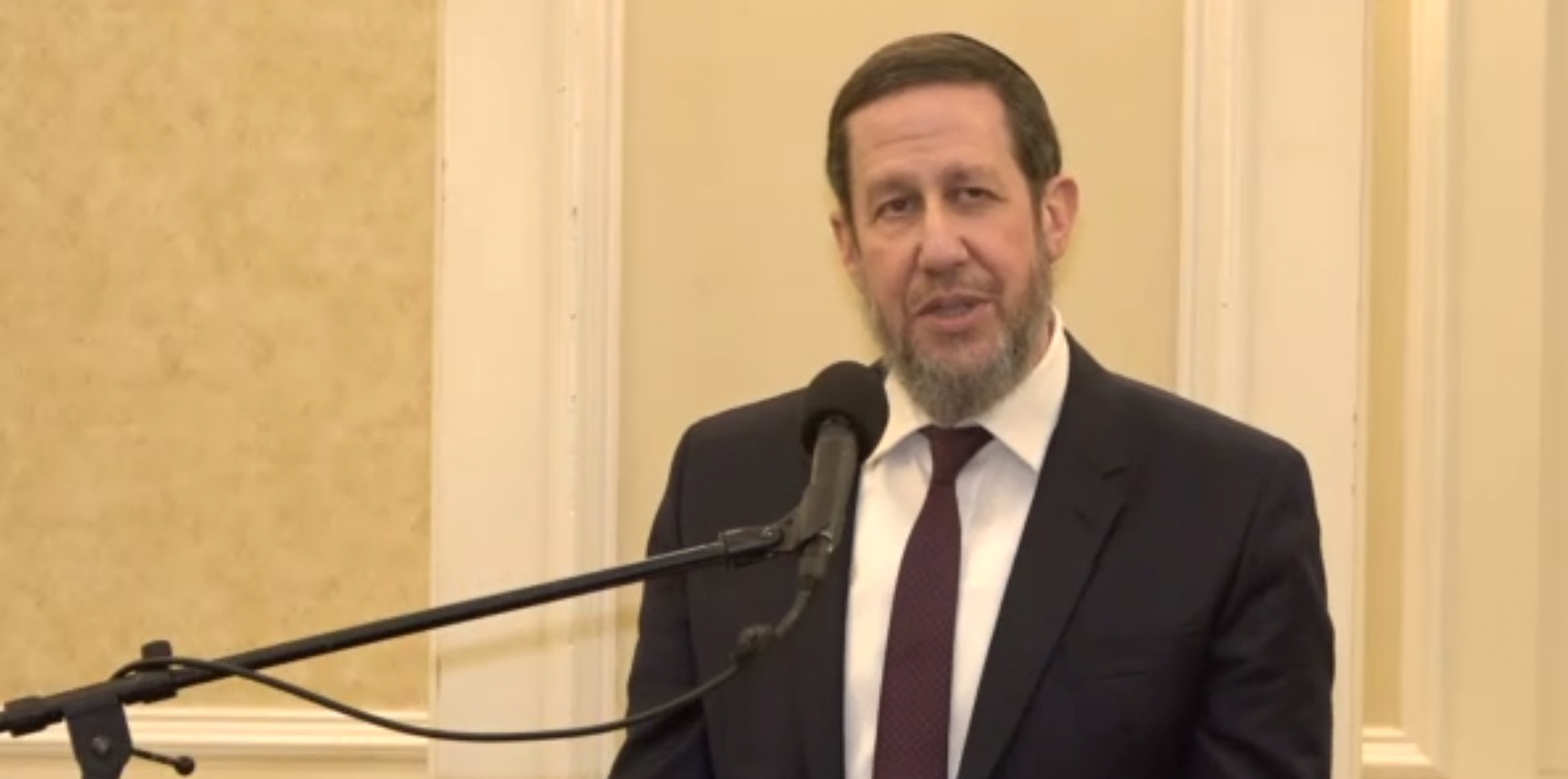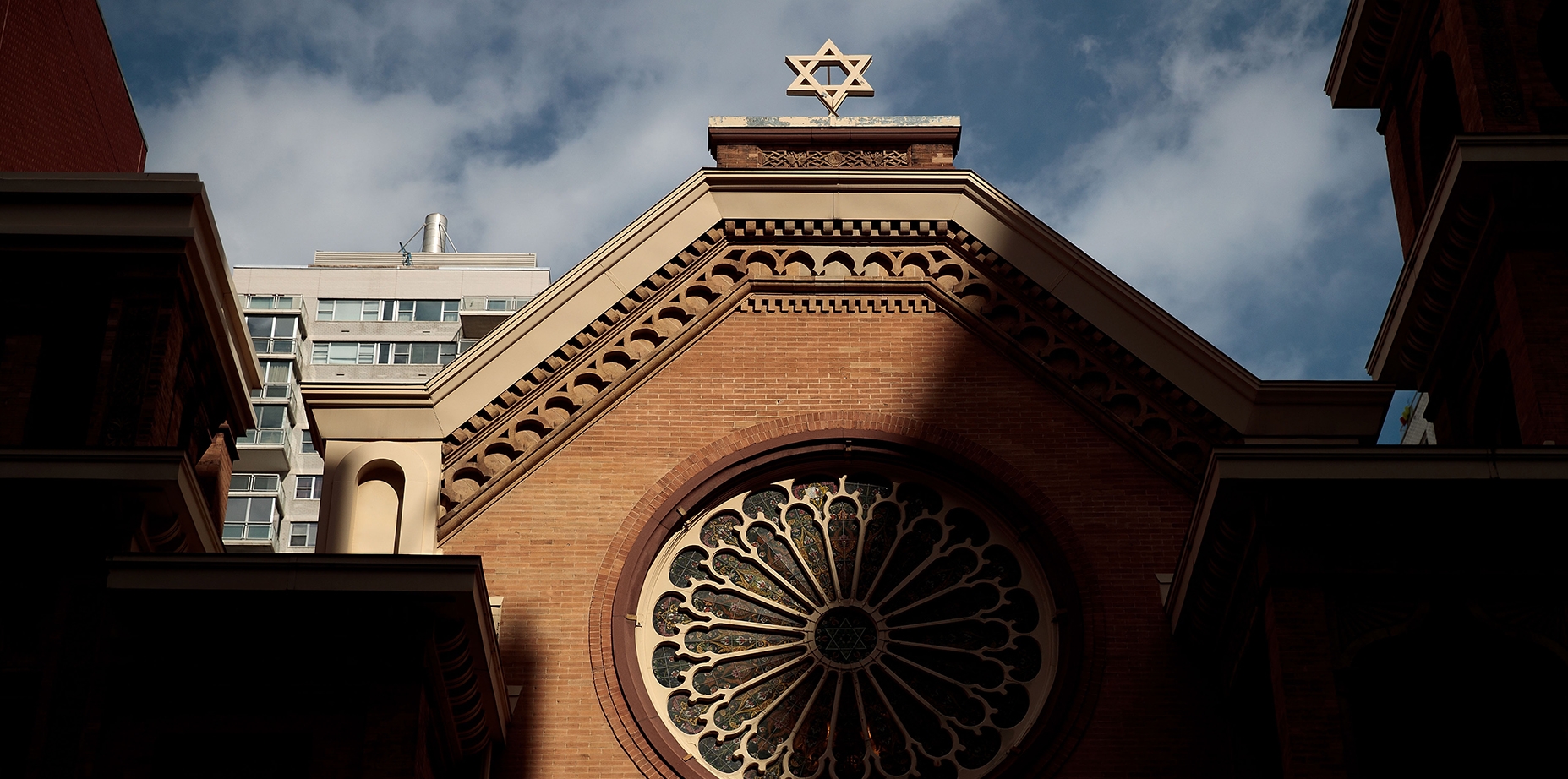UPDATE: On Thursday, Rabbi Yitzchak Schochet withdrew from Park East Synagogue’s rabbinic search, saying in a statement that he would “decline the offer because the amazing Mill Hill [Synagogue] community has been and will remain home.”
(New York Jewish Week) — More than a year after it attracted attention for the abrupt termination of its popular assistant rabbi, Manhattan’s Park East Synagogue was again the scene of a heated squabble on Sunday.
And like last time, the spat centered on who will succeed the Orthodox congregation’s 92-year-old spiritual leader, Rabbi Arthur Schneier.
In the time since the former assistant rabbi, Benjamin Goldschmidt, was ousted, no one has been appointed to take Schneier’s place after his tenure ends. The synagogue announced a search for a “worthy successor” to Schneier 11 months ago, and a public event on Sunday night was supposed to herald the next stage in that process. A candidate for the position, Rabbi Yitzchak Schochet, delivered an hour-long lecture to a crowd of 100 people, including members of the search committee.
But following the talk, the event held in the synagogue’s Charles Brooks Ballroom devolved into a verbal sparring match between Schochet, the rabbi of London’s Mill Hill Synagogue, and Kalman Sporn, a political consultant who describes himself as a “human rights activist.” Sporn questioned Schochet’s past outspoken opposition to same-sex relationships. Schochet claimed that Sporn was engaging in “cancel culture.”
“Park East’s bimah is New York’s hallowed ground for human dignity,” Sporn told the New York Jewish Week. “It must not become a pulpit for prejudice.”
Michael Scharf, who serves on the rabbinic search committee, told the Jewish Week in an emailed statement that Sporn’s comments were “disrespectful” to Schochet.
“Rabbi Schochet is a most distinguished Rabbi with a demonstrable record of great accomplishment, an incredible speaker, a true man of faith, and certainly not one who should be the subject of a smear and libelous campaign emanating from a group of nasty malcontents who obviously did not listen to Rabbi Schochet’s eloquent rejoinders to their issues,” Scharf wrote.

Rabbi Yitzchak Schochet spoke at Park East Synagogue on Sunday about the pursuit of happiness, when some synagogue members began to question him about his record on LGBTQ and Palestinian issues. (Zoom Screenshot)
The incident has prompted congregants to consider whether Schochet has the right temperament to lead a congregation that has hosted a succession of dignitaries, including Pope Benedict XVI. Critics say Schochet’s history of controversy, in addition to his response to being criticized on Sunday, do not accord with the synagogue’s self-image as a distinguished public forum.
And the drama Sunday night has raised the same question that has nagged at the synagogue for more than a year: Who is a fitting replacement for Schneier, a longtime religious freedom activist and former U.S. alternate representative at the United Nations?
Goldschmidt, who was popular among young congregants and was once seen by some as Schneier’s heir apparent, was fired in October 2021. He was subsequently derided by Schneier’s allies as lacking the education and gravitas needed to lead the synagogue. That dispute ended with Goldschmidt founding a breakaway congregation, the Altneu, which also meets on the Upper East Side and has attracted a growing membership.
“Park East has a problem where they really haven’t had a rabbi for many years,” said one member who, like several who discussed the synagogue’s internal debates, wished to remain anonymous. “We’re down on people coming on Saturday. The schools are a problem. COVID hurt us. [Rabbi Schneier] is 92, so on a day-to-day basis, he hasn’t really been involved.” The synagogue is affiliated with the Rabbi Arthur Schneier Park East Day School.
Schochet, 58, is a Chabad-affiliated rabbi who has held a number of prominent positions in British Jewish communal organizations. For three decades, he has been the rabbi of London’s Mill Hill United Synagogue, an 1,800-member Orthodox congregation in northwest London. According to a biography on the synagogue website, he has also served as the chairman of the Rabbinical Council of the United Kingdom’s United Synagogue — Britain’s Orthodox membership body — and as a member of the British Chief Rabbi’s cabinet.
But Schochet has also faced backlash for his comments about Palestinians and their supporters. In 2018, the British Holocaust Memorial Day Trust condemned Schochet for referring to Jews who said Kaddish for Palestinians as “kapos,” or Jews who served in positions of authority in Nazi concentration camps.
In 2015, Middle East Monitor, a pro-Palestinian media outlet, criticized Schochet for two tweets he had written four years earlier in response to a user called “Jew4Palestine.” In one, he wrote, “I have a spare Israeli flag if you want to hang yourself on it.” In the second, commenting on unemployment statistics in Gaza, he wrote, “Then again if you include terrorism as work, it’s 100% employed.” Soon afterward, Schochet was removed as a patron of a charity called Faith Matters.
At the meeting on Sunday, however, much of the criticism of Schochet revolved around his past public opposition to same-sex marriage. Jewish law has traditionally prohibited same-sex relationships, and refusing to conduct same-sex weddings remains normative practice among nearly all Orthodox rabbis.
In 2011, Schochet said that “the time-hallowed sacredness of marriage should always be preserved.” In 2012, the rabbi called gay marriage “an assault on religious values.” That same year, he penned an essay for PinkNews, an LGBTQ-focused publication, called “Homosexuality is prohibited in Orthodox Judaism but so is eating bacon, everyone is welcome.”
In 2014, England, Scotland and Wales legalized same-sex marriage. The following year, Schochet wrote that the Torah prohibits homosexual acts, but does not condemn a person for having homosexual feelings.
Schochet did not respond to a New York Jewish Week request for comment.
Sporn has posted tweets criticizing Schochet’s positions, and at the meeting on Sunday, brought up Schochet’s record of controversial statements during the question-and-answer portion of the event.
“I personally have been troubled by some of the positions you have taken in the past,” Sporn said. “You have openly fought efforts for marriage equality, while you want gay people to in your words feel reassured that they are always welcome into synagogues.”
Sporn was eventually cut off from using the microphone. Schochet responded, saying he had seen Sporn’s tweets. He said he had been invited to write an essay for PinkNews in 2012 “precisely because I was deemed as being the more moderate amongst all the Orthodox rabbis on gay issues.”
He added that the previous year, in a segment that aired on the BBC, he defended a gay couple who were denied access to a hotel room by a Christian owner. Schochet also said that a high-ranking member at his synagogue was gay.
“To everyone’s surprise, other than my own and those who know me to be a liberal conservative, I argued that everyone has a right to uphold their religious convictions without compromise,” Schochet wrote in a blog post about the BBC broadcast. “However, what you cannot do is look to impose those on others. That’s religious fundamentalism.”
In that same blog post, Schochet doubled down on his opposition to gay marriage. “If you choose to reject religion and lead a gay lifestyle, or conduct extra marital affairs, then frankly that is your business,” Schochet said. “That I choose to frown upon what you do because my G-d says it is wrong is very much my entitlement.”
Schochet then began to criticize Sporn, mentioning Sporn’s involvement in a scheme to apportion Catholic papal knighthoods for cash.
“You and I can go on canceling each other all night long,” Schochet said. “Cancel culture, which is the scourge and the malaise of our 21st century is, in the words of Barack Obama, scorched earth, partisan politics, where people we disagree with are maligned.”
(In 2019, regarding condemnations of people on social media, Obama said, “That’s not activism. That’s not bringing about change, if all you’re doing is casting stones, you’re probably not going to get that far. That’s easy to do.” A column on the Jewish website Aish.com about Obama’s comments does criticize “this scorched-earth partisan politics — where people with whom we disagree are denied a fair hearing and a voice in public life.”)
Schochet continued, “it divides families, it divides society, it tears apart relationships, it polarizes and pits people against one another. We may always be two Jews as indeed we are with three opinions, but we should always maintain one heart. I invite you to join me in that mission statement.”
When he finished, the crowd erupted into applause. The room became calm, until later, another member of the congregation, who did not use a microphone, stood up and confronted the rabbi about his exchange between him and Sporn — leading Schochet to apologize to Sporn.
“If I did embarrass you, I do genuinely apologize to you profusely and I hope you forgive me, and I mean that sincerely,” he said.
Addressing the crowd following the incident, Schneier — who has led Park East for more than 60 years — said, “When it comes to the selection of a rabbi, it is entirely up to the membership.”
“The purpose of Rabbi Schochet coming here with us, some of you did not have a chance to to hear him, to meet with him, and now I hope you get to know him a bit better,” Schneier said. “All kinds of rumors, forget about them.”
Schochet’s reaction to Sporn was “a personal attack,” the member who wished to remain anonymous said. He added that Schochet’s conduct did not reflect the decorum the synagogue strives to maintain.
“He ganged [the crowd] up in a mob mentality where they cheered for him,” the member told the Jewish Week. “Instead of answering the question, he attacked him. [Schochet] had such a great opportunity to be diplomatic. This guy is not diplomatic on an interview. Could you imagine if he had a contract? This is almost beyond belief.”
This member also said that Schochet is the only rabbi who has been brought to the synagogue by the search committee.
Another synagogue member told the Jewish Week that Sporn’s tweets attacking Schochet provided critical context for their exchange.
“It did not come across to me as embarrassing to Kalman,” the member said. “It came across to me as Rabbi Schochet saying that what you’re doing is being unfair.”
He added that what is getting lost amidst the squabble is that Park East “is looking for a rabbi.”
“Every member should have the opportunity to come and ask questions,” the member said. “The sense I had from people is that they got a really good understanding of where Rabbi Schochet stands on the issues. Yes, Kalman brought up an issue, and Rabbi Schochet apologized.”
That member said no decisions have been made thus far as to who will be hired.
Meanwhile, Avital Chizhik-Goldschmidt, the wife of Benjamin Goldschmidt, told the New York Jewish Week that the new synagogue they started is “only growing” and that she hasn’t followed developments at her husband’s old congregation.
“I really don’t have anything to do with that place,” Goldschmidt said of Park East Synagogue. “We have moved on.”
The New York Jewish Week brings you the stories behind the headlines, keeping you connected to Jewish life in New York. Help sustain the reporting you trust by donating today.





